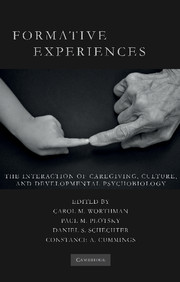Book contents
- Frontmatter
- Contents
- List of Figures
- List of Tables
- List of Contributors
- Foreword by Robert Sapolsky
- Preface
- List of Abbreviations
- Introduction
- SECTION ONE HISTORICAL, CROSS-CULTURAL, AND DEVELOPMENTAL SCIENCE PERSPECTIVES
- SECTION TWO HOW EXPERIENCE INTERACTS WITH BIOLOGICAL DEVELOPMENT
- SECTION THREE FORMATIVE RELATIONSHIPS WITHIN AND ACROSS GENERATIONS
- SECTION FOUR SOCIAL AND CULTURAL CONTEXTS OF CHILDHOOD DEVELOPMENT – NORMATIVE SETTINGS, PRACTICES, AND CONSEQUENCES
- SECTION FIVE FEAR, FUN, AND THE BOUNDARIES OF SOCIAL EXPERIENCE
- SECTION SIX PUBLIC HEALTH, EDUCATION, AND POLICY IMPLICATIONS
- Index
SECTION FIVE - FEAR, FUN, AND THE BOUNDARIES OF SOCIAL EXPERIENCE
Published online by Cambridge University Press: 26 May 2010
- Frontmatter
- Contents
- List of Figures
- List of Tables
- List of Contributors
- Foreword by Robert Sapolsky
- Preface
- List of Abbreviations
- Introduction
- SECTION ONE HISTORICAL, CROSS-CULTURAL, AND DEVELOPMENTAL SCIENCE PERSPECTIVES
- SECTION TWO HOW EXPERIENCE INTERACTS WITH BIOLOGICAL DEVELOPMENT
- SECTION THREE FORMATIVE RELATIONSHIPS WITHIN AND ACROSS GENERATIONS
- SECTION FOUR SOCIAL AND CULTURAL CONTEXTS OF CHILDHOOD DEVELOPMENT – NORMATIVE SETTINGS, PRACTICES, AND CONSEQUENCES
- SECTION FIVE FEAR, FUN, AND THE BOUNDARIES OF SOCIAL EXPERIENCE
- SECTION SIX PUBLIC HEALTH, EDUCATION, AND POLICY IMPLICATIONS
- Index
Summary
INTRODUCTION
The material in this section reflects the growing recognition that a complete account of development involves concerted attention not only to emotional as well as cognitive and physical needs of any individual child, but also to the larger social conditions under which children grow up. Six arresting observations from this section illustrate the point:
Cycles of violence: A boy afflicted by PTSD from social violence, including violence inflicted by his brother, recounts as his most traumatic memory, the public beating and humiliation of that same brother (Lemelson et al., p. 379–380, this volume).
Sensitive periods: Brain maturation in puberty and adolescence opens a window of developmental sensitivity to particular experiences (De Bellis, p. 394–396, this volume), exemplified by a reversal at puberty of the effect of defeat in hamsters (Huhman, p. 436–437, this volume).
Pervasiveness of trauma: In a clinic population of an inner city population of Atlanta, 50% of clients counted a murder victim among their relatives (Jasnow & Ressler, p. 452, this volume).
Adaptation and survival: The consistent associations of early experience of violence and hostile environments with risk for later violence might be considered in light of their evolved survival value rather than as pathology (Koolhaas, p. 402, this volume). At another level, social emotions such as shame and defeat may be experienced at the collective rather than individual level (Wilce, p. 467–468).
Cultural epidemiology: Both the “epidemic” of diagnosed attentional disorders and the consequent psychotropic medication of children may represent products of cultural practices that generate both the initial condition and the developmental outcome via their impact on contextual conditions and demands, and on neurocognitive functioning (Panksepp, pp. 470–471).
[…]
- Type
- Chapter
- Information
- Formative ExperiencesThe Interaction of Caregiving, Culture, and Developmental Psychobiology, pp. 375 - 377Publisher: Cambridge University PressPrint publication year: 2010



